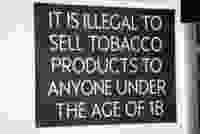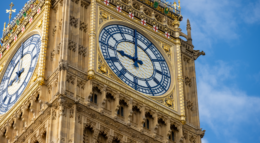
Why is post-Brexit Britain still slavishly following EU rules on Tobacco and Vaping?
Since the UK left the EU, it has signed independent trade deals all over the world, hosted the G7 and restored our iconic blue passports. But Gary Robinson writes that for millions of Britons who choose to use tobacco or e-cigarettes, Brexit simply never happened.
Part of what lead to the Brexit vote and the referendum outcome to leave was a feeling amongst ordinary people that decisions were being made, without their consent or input, by mysterious grey-suited men and women in Brussels. Despite the referendum outcome, EU rules like the EU Tobacco Product Directive still apply to businesses and individuals today, despite the public's decision to leave the bloc way back in 2016.
The question you might ask is how do these EU rules still affect UK businesses and citizens? Quite simply, they were transposed into UK law via a procedure known as a Statutory Instrument, which allows the provisions of an Act of Parliament to be brought into force or altered without Parliament having to pass a new Act. The Tobacco Products Directive for example was transposed into UK law through The Tobacco and Related Products Regulations 2016 (TRPR) and the Standardised Packaging of Tobacco Products Regulations 2015 (SPoT).
Instead of debating and possibly re-evaluating some of these rules now that we have left the EU, some MPs wish to go even further and are calling to raise the age of sale of cigarettes from 18 to 21. One peer's Private Member's Bill even seeks to put grim health warnings on individual cigarettes. Furthermore, on the local government side, it was recently reported that five local authorities have effectively banned smoking outside pubs, cafes, and restaurants.
I accept that the Prime Minister (who has previously been described as a fun-loving, freedom-seeking libertarian and a 'libertarian buccaneer') has had a busy last few years; but surely he can see how illiberal it is to keep pressing on with these measures without any form of public or parliamentary debate? After all, this is the Prime Minister who as Mayor of London opposed a smoking ban in the capital's parks and squares. He also signed an open letter by celebrities and politicians to The Times newspaper opposing a smoking ban in public places. That letter concluded by saying:
"We call on both government and the media to de-escalate the tension on this issue and let common sense and the free market decide the future of British social life."
Perhaps as a response to popular pressure like this letter, the Labour Party's manifesto in 2005 was quite nuanced on the issue of smoking, pledging that:
"…other pubs and bars will be free to choose whether to allow smoking or to be smoke-free. In membership clubs the members will be free to choose whether to allow smoking or to be smoke-free. However, whatever the general status, to protect employees, smoking in the bar area will be prohibited everywhere."
Despite their election promises that venues would retain some element of choice around the issue, Labour totally reneged on these promises once re-elected and pushed for a total ban in pubs and venues, which came into place on the 1st of July 2007.
I don't think that the public expects or even desires the Government to scrap all present legislation around the use, advertising and sale of tobacco and vaping products. But they have every right to expect that illiberal and nonsensical measures can be reappraised and that rules set down by previous Governments (or even the EU) are not set in stone forever. One clear example of this is rules that still mandate shopkeepers to keep tobacco behind barriers and shutters, (ostensibly so that customers are not enticed by the colourful and alluring packaging and 'colourful, eye-catching, cigarette displays') even though tobacco products are no longer allowed to have colourful or eye-catching packages or displays. Surely either the barriers should stay, and the cigarettes be allowed to be sold in their previous packaging, or alternatively, the tobacco packaging remain as grim as at present, but with the barriers removed?
Similarly, the sale of ten packs of cigarettes and small pouches of rolling tobacco has been banned, when common sense would suggest to most people that consumers will simply buy more packets. If we do not now stop to consider the situation, and instead simply continue down this slippery slope, how long before we see standardised wine and beer bottles, hidden behind barriers in shops or labelled with dire warnings and graphic pictures of enlarged livers?
Brexit was fuelled by the feeling that the public was not being consulted about changes that would affect their day to day lives, with UK politicians able to shrug their shoulders and absolve themselves of responsibility for unpopular initiatives. It is important to remember that the Government is not some powerless 'lame duck'. It has an 80-seat majority, is ahead in opinion polls and has three years left until the next General Election. If it cannot hold the 'nanny state' in check now, when can it?
And how long can the Government which got Brexit done, tell the British public that even though they voted to leave the EU, the state still will control what they can vape or smoke (and what tobacco products they can buy) based on EU Directives?













